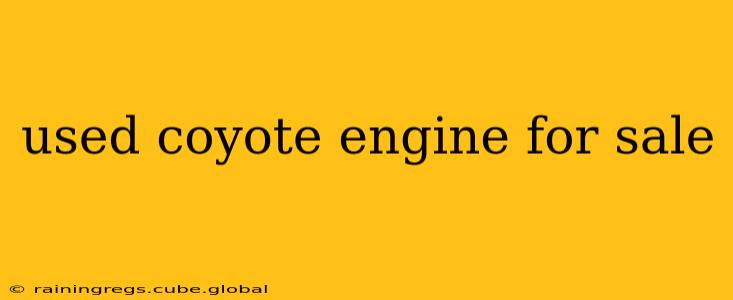Finding a used Coyote engine can be a great way to save money on a performance upgrade or engine replacement. However, it's crucial to approach the purchase with caution and knowledge to avoid costly mistakes. This guide will help you navigate the market, understand what to look for, and make an informed decision.
What is a Coyote Engine?
The Ford Coyote engine is a family of modular V8 gasoline engines produced by Ford since 2011. Known for their power, efficiency, and relatively compact design, they've become extremely popular for both factory applications and aftermarket modifications. These engines are typically found in Mustangs, F-150 trucks, and other Ford vehicles. The specific generation of Coyote engine (e.g., 5.0L, 5.2L) will significantly impact its performance and features.
Where to Find Used Coyote Engines for Sale?
Several avenues exist for finding a used Coyote engine for sale:
- Online Marketplaces: Sites like eBay, Craigslist, and Facebook Marketplace often have listings for used car parts, including engines. Be sure to carefully examine the seller's reputation and the engine's description.
- Specialized Forums and Communities: Online forums dedicated to Ford vehicles and performance modifications are excellent resources. Members often discuss engine sales and offer advice.
- Junkyards and Salvage Yards: These can be a cost-effective option, but you'll need to inspect the engine thoroughly and potentially deal with missing components.
- Performance Parts Dealers: Some performance parts dealers may offer used Coyote engines that have been inspected and potentially refurbished.
What to Look for When Buying a Used Coyote Engine?
Buying a used engine is a significant investment. Thorough inspection is crucial to avoid potential problems down the line. Here's a checklist:
- Engine History: Try to obtain as much history as possible on the engine's usage and maintenance. Was it involved in an accident? How many miles are on it? Has it undergone any major repairs?
- Visual Inspection: Examine the engine for any signs of damage, leaks, or corrosion. Look for cracks in the block or head, signs of overheating, and any unusual wear.
- Compression Test: This test measures the pressure within each cylinder, indicating the engine's overall health. Low compression in one or more cylinders suggests potential issues.
- Leakdown Test: This test checks for leaks in the valves, piston rings, or head gasket. Leaks can lead to significant power loss and damage.
- Documentation: Request any available documentation, including maintenance records, repair invoices, and the original sales receipt.
What are the common problems with used Coyote engines?
While generally reliable, used Coyote engines can suffer from issues like:
- Timing Chain Issues: Some earlier generation Coyote engines experienced timing chain issues, leading to potential catastrophic engine failure. Check for any related repairs or replacements in the engine's history.
- Oil Consumption: Some used Coyote engines may exhibit higher-than-normal oil consumption. This should be thoroughly investigated before purchase.
- Carbon Buildup: This is a common issue in high-performance engines and can affect performance and efficiency. Look for signs of excessive carbon buildup during inspection.
How much does a used Coyote engine cost?
The price of a used Coyote engine varies greatly depending on its condition, mileage, modifications, and the seller. Expect to pay anywhere from a few thousand dollars to well over ten thousand dollars for a well-maintained engine.
What are the benefits of buying a used Coyote engine?
The primary benefit is cost savings compared to buying a new engine. A used Coyote engine can significantly reduce the overall cost of a performance upgrade or engine replacement.
Should I buy a used Coyote engine with modifications?
This depends on your technical expertise and comfort level. Modified engines might offer better performance but could also have hidden problems or require specialized knowledge for maintenance and repair. Unless you're well-versed in engine modifications, it's generally safer to opt for a stock engine.
Buying a used Coyote engine is a significant undertaking. Thorough research, careful inspection, and understanding the potential risks are crucial for a successful purchase. Remember to prioritize a thorough inspection and due diligence before committing to a purchase. This will help ensure you get a reliable and powerful engine for your project.
